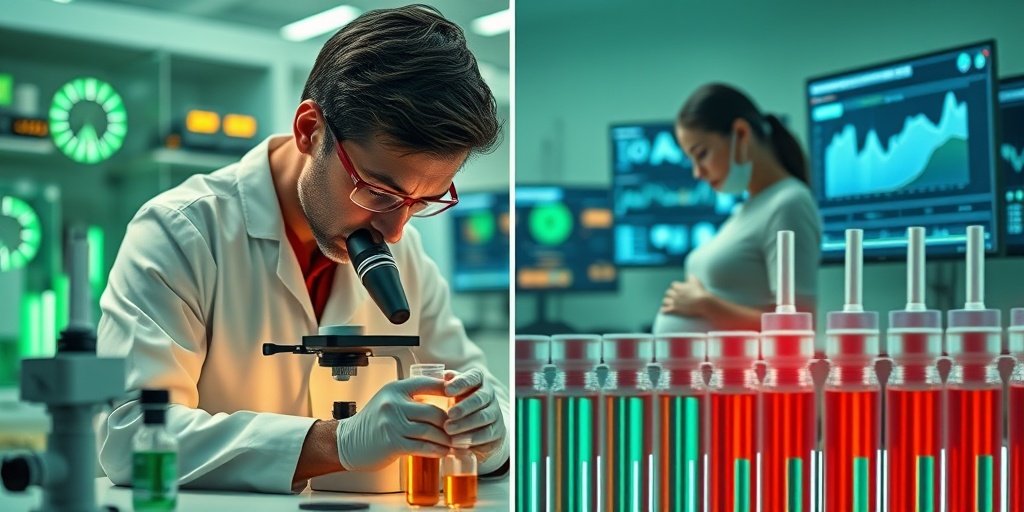⚡ Quick Summary
A recent study identified novel first-trimester serum biomarkers for the early prediction of gestational diabetes mellitus (GDM) in women undergoing in vitro fertilization (IVF). The developed model demonstrated a remarkable AUC of 0.995, indicating its potential for enhancing early detection and management of GDM.
🔍 Key Details
- 📊 Participants: 38 women with GDM and 38 matched controls undergoing IVF
- 🧬 Biomarkers analyzed: Total IgG, total IgM, IL-7, aPS-IgG immune complexes, and IL-15
- ⚙️ Technology: Five machine-learning models, including eXtreme Gradient Boosting (XGBoost)
- 🏆 Performance: XGBoost achieved an AUC of 0.995 for the training set
🔑 Key Takeaways
- 📊 Early prediction of GDM is crucial for improving maternal and fetal health.
- 💡 Novel biomarkers identified could lead to better screening strategies for GDM.
- 👩🔬 Machine learning models, particularly XGBoost, showed exceptional predictive capabilities.
- 🏆 AUC of 0.906 for the combined biomarker model indicates high predictive value.
- 🌍 Study conducted within a large-scale assisted reproductive cohort.
- 🧪 Immunological insights gained may inform future mechanistic studies of GDM.
- 🔍 Further research is needed to validate these findings in larger populations.

📚 Background
Gestational diabetes mellitus (GDM) is a prevalent complication during pregnancy that poses significant risks to both mothers and their babies. With the increasing number of women conceiving through in vitro fertilization (IVF), understanding the early predictors of GDM in this population is becoming increasingly important. However, the lack of reliable biomarkers has hindered early detection efforts, making this study particularly timely and relevant.
🗒️ Study
The study involved a comparative analysis of first-trimester serum cytokine and antibody profiles from 76 women undergoing IVF treatment. The participants were divided into two groups: those diagnosed with GDM and matched controls. Utilizing a robust human biobank, researchers employed machine learning techniques to develop predictive models based on the serum biomarker profiles.
📈 Results
The study successfully identified a set of five differentially expressed biomarkers that, when combined, formed a predictive model for GDM. The XGBoost model outperformed other models, achieving an impressive AUC of 0.995 for the training set and 0.867 for the testing set. This indicates a high level of accuracy in predicting GDM, with a sensitivity of 75% and a specificity of 94.7%.
🌍 Impact and Implications
The findings from this study could significantly enhance early detection strategies for GDM, particularly in the IVF population. By identifying reliable biomarkers, healthcare providers can implement timely interventions, potentially improving outcomes for both mothers and infants. This research not only paves the way for better clinical practices but also opens avenues for further exploration into the immunological mechanisms underlying GDM.
🔮 Conclusion
This study highlights the potential of utilizing first-trimester serum biomarkers in the early prediction of GDM among women undergoing IVF. The development of a robust predictive model using machine learning techniques represents a significant advancement in maternal-fetal medicine. Continued research in this area is essential to validate these findings and refine predictive strategies, ultimately enhancing care for expectant mothers.
💬 Your comments
What are your thoughts on the use of biomarkers for predicting gestational diabetes? We would love to hear your insights! 💬 Join the conversation in the comments below or connect with us on social media:
Novel first-trimester serum biomarkers for early prediction of gestational diabetes mellitus.
Abstract
BACKGROUND: Gestational diabetes mellitus (GDM) is a common obstetric complication worldwide that seriously threatens maternal and fetal health. As the number of women conceiving through in vitro fertilization (IVF) continues to rise, this population is recognized as being at an elevated risk for GDM. However, there is still no consensus on the early prediction of GDM in IVF patients due to the lack of reliable biomarkers.
METHODS: We compared the first-trimester serum cytokine and antibody profiles in 38 GDM women and 38 matched controls undergoing IVF treatment, based on the extensive human biobank of our large‑scale assisted reproductive cohort platform. The 76 samples were divided into a training set (n = 53) and a testing set (n = 23) using a 7:3 ratio, and five diverse machine-learning models for predicting GDM were constructed.
RESULTS: By combining the top five differentially expressed first‑trimester serum biomarkers [including total immunoglobulin (Ig)G, total IgM, interleukin (IL)-7, anti‑phosphatidylserine (aPS)-IgG immune complexes (IC), and IL-15], a novel early prediction model was constructed, which achieved superior predictive value [area under the curve (AUC) and 95% confidence interval (CI) 0.906 (0.840-0.971), with a sensitivity of 75% and a specificity of 94.7%] for GDM development. The eXtreme Gradient Boosting (XGBoost) model achieved an AUC of 0.995 (95% CI: 0.995-1.000, P < 0.001) for the training set and 0.867 (95% CI: 0.789-0.952, P < 0.001) for the test set in predicting GDM.
CONCLUSIONS: We identified a set of novel first‑trimester serum cytokines and immune-related biomarkers and constructed an efficient first‑trimester prediction model for GDM in IVF population. These findings are expected to aid in the development of early predictive strategies for GDM and offer immunological insights for further mechanistic studies of GDM.
Author: [‘Tian S’, ‘Liu M’, ‘Han S’, ‘Wu H’, ‘Qin R’, ‘Ma K’, ‘Liu L’, ‘Zhao H’, ‘Li Y’]
Journal: Nutr Diabetes
Citation: Tian S, et al. Novel first-trimester serum biomarkers for early prediction of gestational diabetes mellitus. Novel first-trimester serum biomarkers for early prediction of gestational diabetes mellitus. 2025; 15:15. doi: 10.1038/s41387-025-00372-z